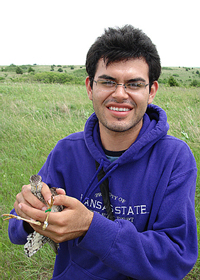|
|
Sources: Jorge Mendoza, klunix@k-state.edu;
and Brett Sandercock, 785-532-0120, bsanderc@k-state.edu
Photo available. Contact media@k-state.edu or 785-532-6415.
Video Available: http://www.k-state.edu/media/audio/podcasts/gordon2.mov
and http://www.k-state.edu/audio/podcasts/devescholars.mov
News release prepared by: Kristin Hodges, 785-532-6415, khodges2@k-state.edu
Tuesday, Jan. 13, 2009
K-STATE STUDENT RESEARCHES DECLINING BIRD POPULATIONS TO HELP RESTORE SPECIES
MANHATTAN -- Jorge Mendoza used to think research sounded dull, but that was until he experienced research firsthand, like spending late summer nights at Kansas State University's Konza Prairie Biological Station as part of a project to better understand the natural history of birds.

Mendoza, a K-State senior in biology and pre-optometry, Garden City, is researching two declining species of birds to understand more about their mating systems and breeding behaviors. The work could ultimately help reverse the species' diminishing populations.
"I never thought in my life I was going to do something like this, but I like it now," Mendoza said. "I used to think it was boring to do research, but now I find it interesting. I like the combination of field work, lab work and office work."
Mendoza is working with Brett Sandercock, K-State associate professor of biology, on the bird research project that started last summer. Mendoza spent 10 weeks in summer 2008 collecting data from the birds as part of the K-State Division of Biology's Research Experience for Undergraduates program, which is coordinated by Sandercock and encourages the professional development of young scientists. The program is supported by grants from the National Science Foundation.
"Undergraduate research projects provide essential training and open new career paths for talented students," Sandercock said. "For many undergraduate students, directed projects are their first introduction to the logistics and social interactions of a research environment. Jorge's training as an undergraduate research scholar will assist him in selecting a career path, whether it is to continue into a professional program or to pursue graduate studies in the ecological sciences."
The project included working at the Konza Prairie, where Mendoza studied both upland sandpipers and common nighthawks. His work involved using radio telemetry, in which he captured both types of birds during the night, and then placed a radio on them and tracked them during the day to find their nests.
Mendoza collected blood samples from the birds, measured their nests and eggs, and eventually took blood samples of the newly hatched chicks. He has completed the fieldwork for the project and now is analyzing the blood samples to determine if the chicks are the birds' offspring.
The project will help determine what kind of breeding behaviors and mating systems the birds have, Mendoza said. The research also aims to find more general information about the birds since little is known about them. Mendoza said by learning more about the birds and how they breed, it is possible that researchers could help their population increase.
K-State's Konza Prairie is a large breeding place for the birds because of its vast grasslands, which also are diminishing in the United States.
Mendoza decided to major in biology because he wanted to be an optometrist. However, after working with Sandercock and the Konza wildlife, his plans postgraduation could include either optometry school or graduate school to study ecology.
"One reason I'm changing my mind from maybe optometry to biology is because Dr. Sandercock is such a great mentor," Mendoza said. "I want to do optometry and become a doctor because I always knew I wanted to help people, but I'm seeing that I can help people in other ways, too."
Mendoza will continue the bird study for his Developing Scholars Program project this year. Sandercock is Mendoza's mentor for the program, which pairs underrepresented students with faculty mentors for research projects.
Mendoza came to K-State as a junior, transferring from Garden City Community College. In the 2007-2008 school year, Mendoza's first year in the Developing Scholars Program, he conducted cancer research.
He is a member of K-State's Hispanic American Leadership Organization, or HALO, Golden Key and the Multicultural Honor Society.
Mendoza has received a National SMART grant, a Hispanic Scholarship Fund scholarship, and a cancer research award through K-State's Terry C. Johnson Center for Basic Cancer Research. He also is part of the Kansas Bridges to the Future program, which is sponsored by the National Institutes of Health and is aimed at underrepresented minority students studying for careers in the biomedical sciences.
A 2005 graduate of Garden City High School, Mendoza is the son of Jorge and Rosa Mendoza, Garden City.